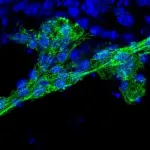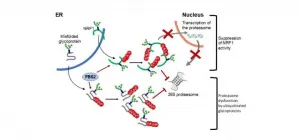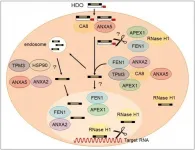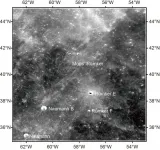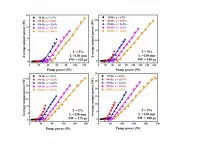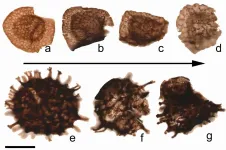Researchers discover way to improve immune response
2021-07-06
Melbourne researchers have identified a way to improve the immune response in the face of severe viral infections.
It is widely known that severe viral infections and cancer cause impairments to the immune system, including to T cells, a process called immune 'exhaustion'. Overcoming immune exhaustion is a major goal for the development of new therapies for cancer or severe viral infections.
A team from the Peter Doherty Institute of Infection and Immunity (Doherty Institute) led by University of Melbourne's Dr Sarah Gabriel, Dr Daniel Utzschneider and Professor Axel Kallies has been able to identify why immune exhaustion occurs and how this may be overcome.
The team had previously identified that while some T cells ...
New signaling pathway could shed light on damage repair during brain injury
2021-07-06
Most human cells are able to repair damage by dividing at wounds.
But mature nerve cells (neurons) in our brain are different. If they attempt division, they will likely die - and this is what happens during brain injury, or in conditions such as Alzheimer's Disease (AD). Now new research led by the University of Plymouth has uncovered a pathway that has shed new light on how these divisions may be triggered.
The research, published today in Cell Reports, has focused on intracellular structures called microtubules - which are found in most animal cells, and can be damaged by a build-up of a protein called Tau in the brain during AD.
The study was conducted in fruit flies, with comparison to postmortem brain samples ...
The twinkle and the brain
2021-07-06
Can you remember the smell of flowers in your grandmother's garden or the tune your grandpa always used to whistle? Some childhood memories are seemingly engrained into your brain. In fact, there are critical periods in which the brain learns and saves profound cognitive routines and memories. The structure responsible for saving them is called the perineuronal net.
This extracellular structure envelops certain neurons, thereby stabilizes existing connections - the synapses - between them and prevents new ones from forming. But what if we could remove the perineuronal net and restore the adaptability of a young brain? The neuroscientist Sandra Siegert and her research group at IST Austria now ...
Sharp size reduction in dinosaurs that changed diet to termites
2021-07-06
Dinosaurs were generally huge, but a new study of the unusual alvarezsaurs show that they reduced in size about 100 million years ago when they became specialised ant-eaters.
The new work is led by Zichuan Qin, a PhD student at the University of Bristol and Institute of Vertebrate Paleontology and Paleoanthropology in Beijing. He measured body sizes of dozens of specimens and showed that they ranged in size from 10-70 kg, the size of a large turkey to a small ostrich, for most of their existence and then plummeted rapidly to chicken-sized animals at the same time as they adopted a remarkable ...
New fossil sheds light on the evolution of how dinosaurs breathed
2021-07-06
An international team of scientists has used high-powered X-rays at the European Synchrotron, the ESRF, to show how an extinct South African 200-million-year-old dinosaur, Heterodontosaurus tucki, breathed. The study is published in eLife on 6 July 2021.
In 2016, scientists from the Evolutionary Studies Institute at the University of the Witwatersrand in Johannesburg, South Africa, came to the ESRF, the European Synchrotron in Grenoble, France, the brightest synchrotron light source, for an exceptional study: to scan the complete skeleton of a small, 200-million-year-old plant-eating dinosaur. The dinosaur specimen is the most complete fossil ever discovered of a species known as Heterodontosaurus tucki. The fossil was found in ...
Dignity support at end of life
2021-07-06
At the end of life, people may have to rely on others for help with showering, dressing and going to the toilet. This loss of privacy and independence can be confronting and difficult.
Now Australian occupational therapy (OT) researchers have interviewed 18 people receiving palliative care about how they feel about losing independence with self-care, specifically their intimate hygiene, as function declines with disease progression.
The study aims to raise awareness of how to provide better care for people at the end of life.
Lead researcher Dr Deidre Morgan, a Flinders University occupational ...
New game-changing zeolite catalysts synthesized
2021-07-06
A research team at POSTECH has uncovered a promising new zeolite, anticipated to be a turning point for the oil refining and petrochemical industries. This research was recently published in the scientific journal Science on July 2, 2021.
The team of researchers led by Suk Bong Hong, a professor in the Division of Environmental Science and Engineering at POSTECH, synthesized two thermally stable three-dimensional (3D) large-pore (12-ring)1 zeolites - PST-32 (POSTECH No. 32) and PST-2, the hypothetical SBS/SBT intergrowth structure2 - by using the "multiple inorganic cation" and the "charge density mismatch" synthetic strategies, respectively. The research team identified their structures by using both powder X-ray diffraction ...
Chemo upsets gut health in cancer patients
2021-07-06
New research in BMC Cancer has shown myelosuppressive chemotherapy destabilises gut microbiome in patients with solid organ cancers.
The study from SAHMRI and Flinders University assessed the gut health of men and women who underwent conventional chemotherapy on cancers, such as breast and lung cancer, without exposure to antibiotics.
"We know that myelosuppressive chemotherapy reduces white blood cell count significantly during the first seven to 10 days of treatment, making the body more vulnerable to infection," says lead author Dr Lito Papanicolas, an infectious diseases expert and clinical microbiologist.
"In this study we focused on how much the individual's microbiome changed over this period, when the ...
Engineered cells successfully treat cardiovascular and pulmonary disease
2021-07-06
Scientists at UC San Francisco have shown that gene-edited cellular therapeutics can be used to successfully treat cardiovascular and pulmonary diseases, potentially paving the way for developing less expensive cellular therapies to treat diseases for which there are currently few viable options.
The study, in mice, is the first in the emerging field of regenerative cell therapy to show that products from specially engineered induced pluripotent stem cells called "HIP" cells can successfully be employed to treat major diseases while evading the ...
University of Guam: Less than 10% of transplanted cycads survive long-term in foreign soil
2021-07-06
A 15-year reciprocal transplant study on Guam's native cycad tree, Cycas micronesica, by the Plant Physiology Laboratory at the University of Guam's Western Pacific Tropical Research Center has revealed that acute adaptation to local soil conditions occurs among the tree population and is important in the survival rate of transplanted cycads. The results show that 70% to 100% of cycads that were transplanted in local conditions survived versus less than 10% that were transplanted in foreign conditions. The article describing the study has been published in the peer-reviewed journal Diversity (doi: 10.3390/d13060237).
Transplantation ...
Vertical greenery can act as a stress buffer, NTU Singapore study finds
2021-07-06
Vertical greenery 'planted' on the exterior of buildings may help to buffer people against stress, a Nanyang Technological University, Singapore (NTU Singapore) study has found.
The benefits of nature on mental health and for wellbeing have long been recognised, and now a team of NTU Singapore psychologists has used Virtual Reality (VR) to examine whether vertical greenery has a stress buffering effect (ability to moderate the detrimental consequences of stress) in an urban environment.
Using VR headsets, 111 participants were asked to walk down a virtual street for five minutes. Participants were randomly assigned to either a street that featured rows of planted greenery (e.g., on balconies, walls, and pillars of buildings), ...
Autistic children can benefit from attention training - new study
2021-07-06
Attention training in young people with autism can lead to significant improvements in academic performance, according to a new study.
Researchers at the University of Birmingham in the UK along with institutions in São Paolo, in Brazil, tested a computer programme designed to train basic attention skills among a group of autistic children aged between eight and 14 years old.
They found participants achieved improvements in maths, reading, writing and overall attention both immediately after undergoing the training and at a three-month follow up assessment. Their results are published in Autism Research.
Lead researcher, Dr Carmel Mevorach, in the University of Birmingham's Centre for Human Brain Health, and School of Psychology, says: "It's ...
Memory making involves extensive DNA breaking
2021-07-06
The urgency to remember a dangerous experience requires the brain to make a series of potentially dangerous moves: Neurons and other brain cells snap open their DNA in numerous locations--more than previously realized, according to a new study--to provide quick access to genetic instructions for the mechanisms of memory storage.
The extent of these DNA double-strand breaks (DSBs) in multiple key brain regions is surprising and concerning, said study senior author Li-Huei Tsai, Picower Professor of Neuroscience at MIT and director of The Picower Institute for Learning and Memory, because while the breaks are routinely repaired, that process may become more flawed and fragile with age. Tsai's lab has shown that lingering DSBs are associated with neurodegeneration ...
Study shows the mechanism how loss of de-N-glycosylation enzyme causes ill effect
2021-07-06
Peptide: N-glycanase (NGLY1) is an evolutionarily conserved enzyme for removing N-linked glycans (N-glycans) from glycoproteins and is involved in proteostasis of N-glycoproteins in the cytosol. In 2012, a rare genetic disorder called NGLY1 deficiency was discovered by an exome analysis. Symptoms in patients with NGLY1 deficiency include global developmental delay, hypotonia, hypo/alacrima, movement disorder, scoliosis, abnormal liver, brain functions and peripheral neuropathy. Unfortunately, no therapeutic treatment is currently available to this devastating ...
Making sense of antisense gene silencing
2021-07-06
Researchers from Tokyo Medical and Dental University (TMDU) find proteins that bind to and regulate tocopherol-conjugated heteroduplex oligonucleotides during gene silencing
Tokyo, Japan - Gene silencing therapies are used to interfere with, or "silence", the expression of genes that are associated with disorders. Now, a team at TMDU has uncovered some of the cellular mechanisms by which the silencing therapies act in cells.
Antisense oligonucleotide (ASO) therapies use small strands of DNA or RNA that are antisense, or complementary, to the associated gene to interfere with its expression. ASO therapies are already available for some diseases, particularly neurological disorders, but their use is at a very ...
Microwave radiation features and lunar regolith parameters inversion of the Rümker region
2021-07-06
China's lunar exploration project can be divided into three steps: "orbiting", "landing" and "returning". At present, the first two have been completed, and the third step, "return", will be achieved by the CE-5, which is the first sample return satellite of China and is expected to drill at a depth of no less than 2 m and bring back about 2 kg of scientific samples. In June 2017, the landing region of CE-5 lunar probe was selected as the Rümker region, which is located in the northern Oceanus Procellarum on the lunar near side and has a long volcanic history and complex geological composition.
Because the geographical scope of the region is not clearly defined, the extent determined by the researchers is 35°-45°N ...
New approach to school transition
2021-07-06
The change from early years services into formal educational settings has long been considered an integral transition point for young people. Now research from Flinders University now asks, "Is service integration actually important to the children?"
A recent paper, published in Children's Geographies, led by Flinders University PhD Dr Jennifer Fane, who is now based at Capilano University in Canada, actually seems to have little impact on children's experiences of this transition.
The Australian Government has supported the Integrated Early Years Services since 2005, following what is considered best practice policy for supporting children and families. It is considered to constitute services that are connected ...
Kepler telescope glimpses population of free-floating planets
2021-07-06
Tantalising evidence has been uncovered for a mysterious population of "free-floating" planets, planets that may be alone in deep space, unbound to any host star. The results include four new discoveries that are consistent with planets of similar masses to Earth, published today in Monthly Notices of the Royal Astronomical Society.
The study, led by Iain McDonald of the University of Manchester, UK, (now based at the Open University, UK) used data obtained in 2016 during the K2 mission phase of NASA's Kepler Space Telescope. During this two-month campaign, Kepler monitored a crowded field of millions ...
Sexual reproduction without mating
2021-07-06
Hannah Enders and Dr. Florian Hennicke describe the precise anatomy of these structures of the poplar mushroom in the Journal of Fungi of 19 May 2021.
An edible wild mushroom
One of the organisms attacked by the fungus Cyclocybe parasitica is the Tawa tree (Beilschmiedia tawa), which is relevant to the timber industry in New Zealand. Cyclocybe parasitica is widespread in the Pacific region and has long been known to the Maori, the indigenous people of New Zealand, under the name "Tawaka" as an edible wild mushroom.
Biology student Hannah Elders, supervised by Florian Hennicke at ...
Muscles retain positional memory from fetal life
2021-07-06
A research collaboration based in Kumamoto University, Japan has discovered that muscles and the resident stem cells (satellite cells) responsible for muscle regeneration retain memory of their location in the body. This positional memory was found to be based on the expression pattern of the homeobox (Hox) gene cluster, which is responsible for shaping the body during fetal life. These findings are expected to provide clues to elucidate the pathogenesis of muscle diseases such as muscular dystrophy, in which the position of muscle vulnerability varies depending on the type of muscle, and to help develop regenerative ...
Sodium solid electrolyte combining high conductivity with electrochemical stability
2021-07-06
Overview:
A research team from the Department of Electrical and Electronic Information Engineering at Toyohashi University of Technology developed a chlorine (Cl) substituted Na3SbS4 solid electrolyte for use in all-solid-state sodium (Na) ion batteries. Compared to the sample without a Cl substitution, the ionic conductivity of the Na3SbS4 solid electrolyte where sulfur (S) was partially substituted with Cl improved by up to three times. The team also demonstrated that the Cl-substituted Na3SbS4 has a crystal structure framework that allows Na ions to move easier ...
Non-stop signal achieved in high-power Er3+-doped mid-infrared lasers
2021-07-06
The Mid-infrared lasers (MIR) with high peak power and high repetition rate operating in the range of 2.7~3 μm have important application in laser surgery and optical parametric oscillator (OPO).
A recent study conducted by SUN Dunlu's research group at the Hefei Institutes of Physical Science(HFIPS) of the Chinese Academy of Sciences (CAS) achieved high power, high efficiency and quasi-continuous mid-infrared laser in the free running and langasite [La3 Ga5 SiO14 (LGS)] Q-switched modes by using the Er3+ ions-doped YAP crystals as laser gain medium.
Based on their previous research work on laser, the researchers further improved the laser performance of Er:YAP laser crystal by laser-diode (LD) side-pumping method, a Er:YAP crystal ...
Counting sheep and still awake? Mindfulness therapy may help bring on the zzz's
2021-07-06
Sleep problems are common in the general population with up to half of Singaporean adults reporting insufficient or unsatisfying sleep. Sleep quality tends to worsen with age and poor sleep is a modifiable risk factor for multiple disorders, including cardiovascular disease and cognitive impairment.
Currently, insomnia is treated with either medication or psychological interventions. However, even frontline treatments such as cognitive-behavioural therapy have limitations - up to 40% of patients do not get relief from their insomnia symptoms after undergoing ...
Wallonia as an international reference for the timeline
2021-07-06
In 2016, researchers from the EDDyLab - Evolution & Diversity Dynamics Lab - at the University of Liège (Belgium) proposed a new definition of the geological boundary between the Devonian and Carboniferous periods (359 million years). This new definition has been tested by hundreds of researchers around the world and the results are now compiled in a special issue of the journal Palaeodiversity & Palaeoenvironments.
Geological time is divided into periods (Cambrian, Carboniferous, Jurassic, etc.), together covering the 4.6 billion year history of the Earth. The many climatic, environmental and biological changes that have punctuated this history are recorded in the rock layers, forming an incredibly rich archive of the Earth's past. "The study of these successive ...
Why does Mercury have a big iron core?
2021-07-06
Scientists from Tohoku University and the University of Maryland have pinpointed the strong magnetic field of the early sun as the reason behind the radial variation of rock and metal in rocky planets' cores. This magnetic field, which pulled small iron grains inward, explains Mercury's big iron core and why Mars has so little iron in its core.
The details of their research were published in the journal Progress in Earth and Planetary Science on July 5, 2021.
Planets have iron cores surrounded by a rocky shell, mostly made up of mantle and a thin skin of crust. The four inner planets of our Solar System, Mercury, Venus, Earth, and Mars have their own distinctive size and density. These ...
[1] ... [2144]
[2145]
[2146]
[2147]
[2148]
[2149]
[2150]
[2151]
2152
[2153]
[2154]
[2155]
[2156]
[2157]
[2158]
[2159]
[2160]
... [8818]
Press-News.org - Free Press Release Distribution service.





